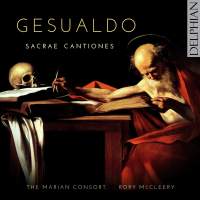Texte paru dans: / Appeared in: |
|
|
Outil de traduction (Très approximatif) |
|
|
Reviewer:
Alexandra
Coghlan The Marian Consort’s latest release goes some way to redressing this balance, putting the focus on Gesualdo’s first volume of motets. Scored for five voices, these are even less familiar than the six-voice second volume, and have received only two notable recordings in recent years (in 1993 by the Oxford Camerata and in 2014 by the all-male ensemble Odhecaton). The works of the liber primus owe as much to the prima pratica tradition of Palestrina as they do to more programmatic, madrigalian writing. And it’s precisely this restraint, the careful deployment of expressive colouring and word-painting that gives them their power – each gesture more telling for its comparative rarity. These are
impeccable performances, easily the finest on record, the single voices of Rory
McCleery’s ensemble delivering a vertical textural clarity lacking in both of
the earlier discs without sacrificing horizontal blend and balance. The generous
acoustic of Merton Chapel adds warmth and bloom without letting things get too
blowsy. Musically it’s no surprise that Gesualdo is at his best in penitential
works – ‘Hei mihi’, ‘Laboravi in gemitu’, ‘O vos omnes’ – but more surprising is
the delicacy and the unexpected (and emotionally devastating) moments of
chiaroscuro optimism that colour even the darkest texts. It’s the major-key
suggestions of ‘Peccantem me quotidie’ that slay, not the stabbing suspensions. |
|




